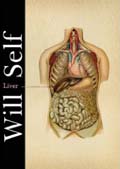Read Will’s latest Standard column here.
16.09.08
Read Will’s latest Standard column here.
16.09.08
If you missed Will talking about Liver on Radio 4’s Front Row yesterday, you can listen again here.
One of the first reviews of Liver, from Time Out.
I have mixed feelings about the threatened closure of the Colony Room Club in Soho, which comes in the same week that a major exhibition of its most famous member — Francis Bacon — opens at Tate Britain.
As a naïve 18-year-old, I was inducted by my late friend Ben Trainin — one of the barmen — into the Colony’s atmosphere of Forties acerbity. My liberal and suburban sensibilities were at once appalled and enthralled by the Colony. It seemed a grubby little room to have been the cockpit of a social revolution — and yet this was undoubtedly the case.
Even then, in the late Seventies, you could still hear vestiges of Polari — the theatrical and latterly gay argot — spoken by its habitués. The prevailing ambience was one of extreme and camp decadence, verging on amorality.
The personal pronoun employed for everyone, regardless of sex, was “she”, and the preferred word was “cunt” in nounal, adjectival and even adverbial forms.
The likes of Dan Farson, John Deakin and Tom Baker were regulars, but the real lustre was given to the Colony’s gloomy interior by the presence of Bacon. I was roundly insulted by its then proprietor, Ian Board. However, I got to drink champagne with Bacon, and to go with him to “celebrate” the opening of Janus, the S&M porn shop on Old Compton Street that is still trading to this day.
I heard ideas and opinions expressed in the Colony that quickened the pulse of my own iconoclasm: there were no prisoners taken at the Colony — for a start, there was no room to keep them.
With the benefit of hindsight, the truth is that the Colony Room was in decline long before I started drinking there. It existed, under its original owner, the self-styled “Queen of Soho”, Muriel Belcher, as an avant garde of the sexual liberation and social promiscuity that was to come. Here, all orientations, ages and classes mixed. Almost the only criterion for membership was that you weren’t boring.
So intense was the impression made on me by the Colony that 30 years later I’ve written a novella set in the club, Foie Humain, which is part of my new book, Liver. The overall title gives the lie, for while some may say the Colony represents the old Soho that is being killed off by smoking bans and other sanitising measures, the truth is that there was another criterion for membership: the hardcore members were first and foremost raging alcoholics.
Ian Board died of cirrhosis; I suspect Muriel Belcher did too. What has done for the Colony as much as anything else is 24-hour drinking. To begin with it was an afternoon club, where a select group could indulge in the naughtiness of drinking after-hours. Now anyone can get a drink from an offie and stand in Old Compton Street swigging it.
It may not be pretty, it may be a bit boring, but for old Colony Room stagers they must accept that it’s a victory — of sorts.
09.09.08
Listen to Will speaking on Laurie Taylor’s Thinking Allowed programme: “Laurie Taylor discusses how reality and fantasy combine to create our experience of the modern city. He is joined by the novelist Will Self, the sociologist Richard Sennett and the geographer Doreen Massey in the Radio Theatre at Broadcasting House.”

Liver – Will Self
![]()
![]()
See all books by Will Self at
Amazon.co.uk | Amazon.com
Synopsis:
These remarkable new pieces from Will Self each feature the largest of our internal organs: the liver, in varying states of disease and decay. In “Foie Humane” we go inside a Soho drinking club, the denizens of which live in a highly stylised yet emotionally dead state of excess. “Prometheus” tells the story of a dazzlingly successful advertising copywriter who can sell anything to anyone at any time. But things go wrong when he meets Zeus, a bigshot entrepreneur with a beautiful and manipulative wife. Tony Phillips’ subterranean Kensington flat is the setting for “Birdy Num Num,” where obsessives spend their days in a crepuscular realm of cocaine and heroin. Finally, in “Leberknodel’, a terminal liver cancer patient travels to Zurich to commit assisted suicide. When she arrives, however, the cancer mysteriously goes into remission.
“Some people may say toujours Provence, but having just got back from the South of France, I re-immersed myself in London like a baby swimming into a birthing pool. We went to get the puppy from his very kind dogsitters in Shoreditch, then walked home via Bunhill Fields, London Wall, St Paul’s and the South Bank. Where in the world could you get such astonishing contrasts of people, of architecture, and of different senses of deep time? In Bunhill Fields we paid homage to Blake and Defoe, then, walking down towards the Barbican, I noticed through some plate glass doors belonging to the City University the viridian square of a cricket pitch. Who would have imagined that such a space would be given over to sport in the costliest square mile on earth? A perfect London moment indeed.”
26.08.08
Read Will’s latest Standard column here.
02.09.08
Read Will’s latest Necessary Steps column in the New York Times.
26.08.08
will-self.com is the official website for British novelist and journalist Will Self. The site is managed by Chris Hall and Chris Mitchell.
If you want to get in touch, you can email us at info@will-self.com
All email will be read, but we can’t guarantee a response.
PR agencies, please DO NOT put this email address on any mailing lists.
If you have a specific request for Will regarding commissions, book rights etc, you can contact his agent via agent@will-self.com